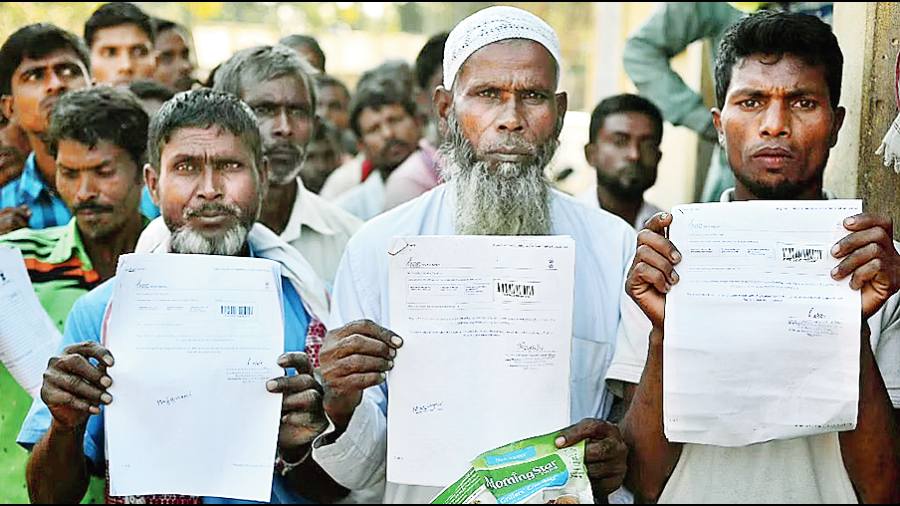Book: This Land is Mine, I Am Not of This Land: CAA-NRC and the Manufacture of Statelessness
Editor: Harsh Mander and Navsharan Singh
Publisher: Speaking Tiger
Price: Rs 499
This book is a serious reflection on what may be called ‘intellectual politics’. Focusing on the Citizenship (Amendment) Act, 2019 and its complex relationship with the National Register of Citizens, the book tries to offer a factual, nuanced, and theoretically diverse account of this debate. This intellectual openness encourages the reader to draw his/her own meanings of the CAA-NRC politics in its entirety.
The book emphasizes the fact that Indian citizens constitute a political community envisaged by the Constitution on a secular basis. The contributors question the dominant politics of citizenship and, in a way, force us to rethink the fundamental values that we cherish as citizens of the Republic. In this sense, we as readers are not merely addressed as recipients of information and analysis; instead, the volume asks us to take an informed position as moral participants and committed citizens.
The book brings together a selection of previously published essays/articles with a few originally written chapters. These essays are classified into four thematic categories with a brilliant Introduction by Harsh Mander and an equally persuasive Afterword by Navsharan Singh. The first part looks at the theoretical aspects associated with the idea of citizenship and their actual political manifestations. The second part deals with the citizenship debate in Assam. The third part unpacks the debate on an all-India NRC in the wake of CAA, 2019. Finally, the fourth part critically looks at the interconnections between CAA and NRC in the wider context of anti-CAA protests.
The CAA 2019, as we know, offers instant citizenship to non-Muslim religious minorities from three neighbouring Muslim countries. This law is based on a strong premise that the non-Muslim religious minorities — Hindus, Sikhs, Buddhists, Jains, Parsis and Christians — face religious persecution in Afghanistan, Bangladesh and Pakistan. Hence, there is a need to grant them Indian citizenship on a priority basis.
More specifically, the CAA excludes Muslims in two ways. It highlights the persecution of non-Muslims in neighbouring Muslim countries and, at the same time, does not include Muslims in the list of preferred migrants. This exclusion may be seen as a violation of Article 14 (equality before law) and Article 25 (freedom of religion). These two serious shortcomings of the CAA are systemically analysed by a set of essays.
The CAA 2019’s complicated link with NRC is another theme that is explored critically. It is worth noting that NRC and the National Population Register are important constituents of the contemporary legal framework of Indian citizenship. These mechanisms classify Indian residents into citizens and doubtful persons. This simple classification gets a radically different interpretation of citizenship if NRC/ NPR are re-read in relation to CAA, 2019. Various essays in the book explore this aspect.
It is demonstrated that the NPR 2020’s stated objectives such as the collection of additional data — Aadhaar card number and parents’ birthplace — cannot entirely be treated as usual administrative business. It is mandatory for all residents to provide such information. However, if a resident fails to submit sufficient documents to NPR officials, including the proof that his/her parents were/are Indian citizens, his/her citizenship may become doubtful. He/she would be listed in the ‘D’ category of the proposed NRC. The government has not yet evolved any mechanism to deal with such cases. Nevertheless, a person would become Stateless in this process.
Interestingly, the CAA 2019 offers a clear-cut answer to these ambiguities. It is easier for a doubtful Hindu, Jain, Sikh, Parsi, Buddhist and Christian person/resident to apply for Indian citizenship (or inclusion in NRC) even if he/she does not have sufficient documents. However, a doubtful Muslim would eventually be treated as a foreigner as he/she is excluded from the list.
The NRC exercise in Assam is a relevant case study in this volume to expand the scope of this discussion. A set of essays shows that documents like the Aadhaar, ration card, and voter card were not accepted by the officials as evidence of citizenship in Assam. In many cases, residents were asked to produce certificates/papers that could demonstrate that their parents were born in India and had legitimate Indian citizenship. As a result, the classification of citizens becomes a communally charged issue in the state.
The idea of Statelessness is a crucial intellectual-political contribution of this volume.
It underlines the secular limitations of the CAA-NRC framework. And, at the same time, it reminds us that the poor, non-Muslim migrants from Pakistan, Bangladesh and Afghanistan would also become Stateless for at least five years. After all, there is no guarantee that they would eventually get Indian citizenship.










